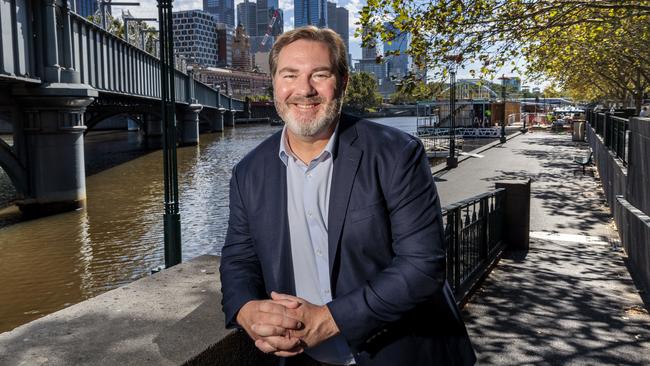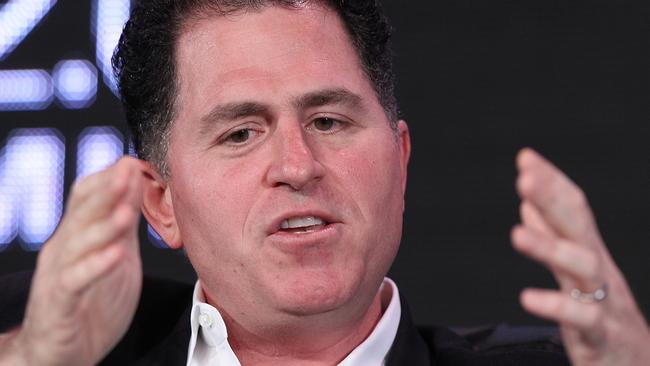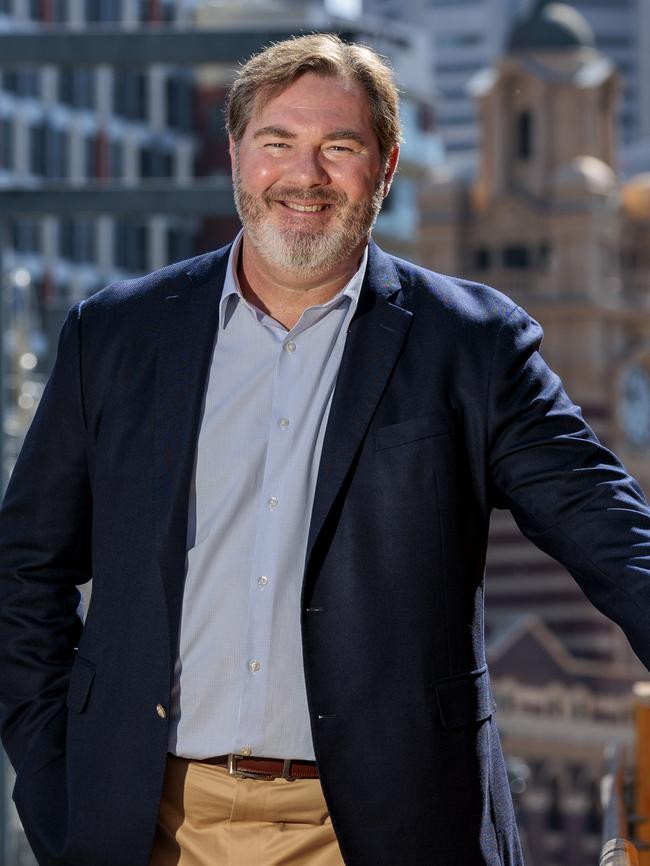Peninsula Capital boss Dillon Hale on Elon Musk, and working with Michael Dell
Peninsula Capital boss Dillon Hale went to school with Elon Musk, cut his teeth with the likes of Jeff Skoll and Michael Dell and is now steering investments for Australia’s wealthiest families.

Dillon Hale spent his last two years of school as a classmate of Elon Musk at the exclusive Pretoria Boys High in the southern suburbs of the city known as South Africa’s administrative centre, and in the Spring as “Jacaranda City” as its tree-lined streets burst into mauve blossoms.
Hale remembers the Tesla founder as an eccentric, introverted student who would always back himself 100 per cent, even if he was wrong.
“I remember him standing up in the history class and telling the teacher he was wrong on the causes of World War One,” Hale recalls.
While they were never close friends and their worlds moved apart when Musk went overseas to Silicon Valley, they reunited when Hale landed in Palo Alto as one of the four principals at Capricorn Management, the family office for Canadian engineer-turned tech entrepreneur Jeff Skoll, the Co-founder and first CEO of eBay.

Capricorn had been an early investor in Tesla and made 10 times its money on its investment in the electric car maker when it sold out at its listing in 2010.
Hale remembers Musk recognising his Pretorian accent when he came to Capricorn’s offices to pitch his rocket and spacecraft-maker SpaceX to external investors for the first time.
They swapped a few school stories before Capricorn eventually backed a Series C funding round for SpaceX, the first external capital into a firm Musk believes will commercialise space travel.
“They sold that down over time as the valuation of SpaceX went through the roof,’’ Hale says.
“That is the common model between the two family offices where I worked. You have a static level of risk and you try and maintain it over time. Because you have a long term time horizon, you’re looking through cycles.”
Early Days
The second family office was that of Michael Dell, founder and owner of Dell Technologies, where Hale was head of Asia and helped manage $US19.3bn ($26.8bn) across multiple different internally managed strategies.
The family office group was also responsible for the management of the investment portfolio of the Michael & Susan Dell Family Foundation.
The frameworks Hale applied to two decades working with Skoll, Dell and more recently with Hong Kong-based Chinese family offices he is now rolling out to Australia’s wealthiest families through his local firm Peninsula Capital Asia.
Two of the three operating partners at Peninsula still hold roles at global family offices – one works directly for PayPal founder Peter Thiel out of his family office and the other is responsible for management of the wealth of a prominent European family with close connection to commodities trading giant Glencore.

Peninsula also has an association with Smorgon family scion David Smorgon’s boutique advisory firm known as Pointmade, which helps families navigate the often complex multi-generational dynamics and decisions at the intersection of family, business and ownership.
“David focusses on family dynamics, conflict resolution and succession – I call them the soft issues that are actually the hard issues. He pulls me in to have conversations with clients around family offices and investment portfolios,’’ Hale says.
He sees himself as an “evangelist” for family office best practice for families seeking a multi-generation outcome of what he calls “perpetual capital”.
This is what he calls a 60-40 (equities versus bonds and cash) long-term risk framework that seeks to hold risk stable over time.
“So when an equity market drawdown takes place, their equity risk level has dropped and all things being equal they then buy equities or equity like assets. Conversely when the market accelerates to new heights they sell, as their equity risk level has been exceeded,” he says.
“The model which has a constant level of risk is what they focus on over time and through cycles. This is one of the key tenets of perpetual capital management.”
But the number one priority of the strategy is not to lose money.
In addition to listed equities, the 60 per cent component also includes unlisted assets such as private equity and venture capital. The remaining 40 is not just corporate bonds or liquid fixed income, but also private lending and market neutral hedge funds.
Common mistakes
Hale says too many Australian family offices fail to adopt this model and instead try to time the market.
“They respond to ‘noise’. Top-down macro views generally, and feel they have to do something for reasons of fear or greed,” he says.
“They have undeveloped forums for the consideration of this noise – investment committees with a diversity of independent views and experiences.
“Decisions are made on gut, not rational considered analysis and questioning. Very often investment committees have members that are conflicted and exert substantial influence driving decisions.”
Hale also worries about the levels of high conviction investing across Australia’s wealthy. Too often he sees hundreds of tiny individual positions in a family office portfolio, especially when it uses many different private wealth managers or private banks.
This causes what he calls “diworsification”.
“Too many separate investment managers in an asset class have the effect of watering down the overall returns for that asset class. This is because the benefit from holding winners is diminished or muted by their lower weighting in the asset class,’’ he says.

Hale witnessed the power of conviction at Michael Dell’s family office where it held a limited number of underlying investments in each asset class/strategy across a large portfolio.
“We spent a long time undertaking due diligence and needed to develop real conviction before making an investment. After spending meaningful time, effort and resources if conviction ensued, we made a meaningful investment. The impact of this on the portfolio was that when such a position did well it had a measurable impact on the asset class return. When a number of such high conviction positions do well in the portfolio it leads to great returns,” he says.
Hale believes his “perpetual capital” model is getting traction with a number of the nation’s richest families. He is currently a member of the investment committee at three single family offices in Australia, providing independent value add and guidance.
But he has also met resistance.
“It regularly goes to legacy relationships and legacy thinking. For example I hear, ‘We have made our money in real estate, lets keep reinvesting in real estate.’ Ultimately I call myself a family office fiduciary – you are trying to act in the best interests of the family,” he says.
Family first
The take up of the strategy has also been driven by the second or third generation members of families or the first generation who want to talk about what happens after their passing.
Many founders believe their children are not up to managing the family fortune.
“85 per cent of the time the patriarchs think the next generation are drop kicks. So this model protects the family against itself, as such,” Hale says.
“The problem is also that many of these kids are not part of the decision making when it comes to the allocation of the passive capital outside the operating business.”
Hale will never trade his time with Dell and Skoll, describing the former as “not a typical tech geek.”
“He was a really social human being who did not have illusions of grandeur. When we were in the New York office, he would come in and use the same toilet as us. He had his feet on the ground,” he says.
“Michael is also a corporate animal – he runs corporate strategy. Michael was also able to turn the company around with some major acquisitions, namely EMC. He has done extremely well and in the process his personal wealth has grown significantly.”
Skoll, Hale says, “always thought he got unfairly lucky through the listing of eBay”.
“So he always felt he had to do something with his capital that was giving back in some way or form,’’ he says.
“Investing through the family office had to reflect Jeff’s values. So we were essentially doing Impact Investing before the terminology became popular. For example the environmental aspect to the Tesla investment was especially important.”
The Capricorn family office is also responsible for the investment portfolio of the Skoll Foundation, the founder-owner of Participant Media, that has since made more than 100 movies and won more than 21 Academy Awards. Each feature political or social messages.
The most famed is An Inconvenient Truth, the 2006 documentary featuring former Vice President Al Gore in which Gore presents what he believes to be the inevitable consequences of climate change.
Hale was what he calls one of the “staff guinea pigs” required to watch a preview of the film before its public release.
“I hugely respect what Jeff has done. The amount of money he has given away to charitable and philanthropic pursuits is extraordinary,” Hale says. He still keeps in regular contact with the managing partner of the Capricorn family office.
Hale has bet many of Silicon Valley’s tech billionaires, noting there is a common trait to their personalities.
“Generally they are not social animals, they may be on the Asperger’s scale, are extremely creative and lateral thinkers. But they are also quirky. They may not look you in the eye when they talk to you,” he says.
“Good family offices create an environment to draw out those individuals.”
Bright future
Hale is excited about the predicted year of volatility ahead for global share markets, as the spectre of inflation weighs on central banks around the world.
“What I am hoping personally is this will lead to a normalised inflation rate. There have been excesses in the system and we have seen the rise in recent years of speculative asset classes such as crypto,” he says.
“More recently we have seen a refocus on asset quality. Not only in the public markets but in the private. There will be a far bigger focus on what you get for your dollar. That will impact speculative asset classes and venture capital.”
But following his long term conviction mantra, Hale has also been encouraging clients not to be afraid to make allocations to asset classes and investment managers that may currently be showing a negative returns.
“If you have conviction in those managers, you allocate there. I am personally pretty thrilled that we are going through a bit of a gyration,” he says.
“Once the market works out the tenor of these interest rate increases, there will be more calm. And the net effect will be a welcome move towards quality.”





